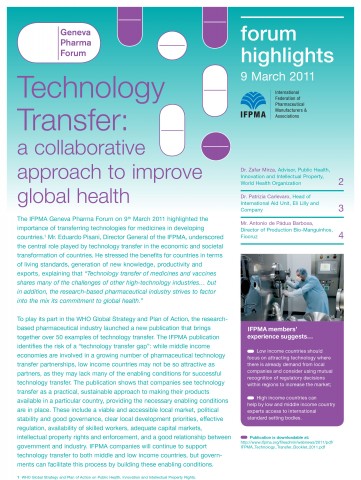A paper published today by the International Federation of Pharmaceutical Manufacturers & Associations (IFPMA), which represents the R&D-based pharmaceutical industry worldwide, documents the growing trend of technology transfer in medicines and vaccines. It also identifies the critical enabling conditions which allow technology transfer to contribute successfully to global economic development and health.
Mr. Eduardo Pisani, IFPMA Director General, said: “Through technology transfer, R&D-based pharmaceutical companies are helping partner companies around the world to make advanced medicines and vaccines for their local markets. This is stimulating economic and social development, while also contributing to the health of recipient countries’ populations. With appropriate government encouragement and continued engagement by our members, the benefits of this approach could be extended to more countries. WHO Member States have asked us to share our best practice in this area, and this is what our new paper delivers.”
The importance of transferring technologies for medicines and vaccines is recognized in the World Health Organization’s Global Strategy and Plan of Action on Public Health, Innovation and Intellectual Property Rights. This calls on member states “to promote transfer of technology and production of health products in developing countries through identification of best practices, and investment and capacity building” 1 .
The new IFPMA paper “Technology Transfer: a Collaborative Approach to Improve Global Health – the R&D Pharmaceutical Industry Experience” seeks to contribute to policy discussions by providing a directory of more than 50 case studies, along with conclusions drawn from industry’s 20 years of experience in this field.
The IFPMA paper identifies the risk of a “technology transfer gap”: while middle income economies are involved in a growing number of pharmaceutical technology transfer partnerships, low income countries may not be so attractive as partners, as they may lack many of the enabling conditions for successful technology transfer. The paper therefore recommends that low income country governments should help to improve local companies’ attractiveness as technology transfer partners, encourage them to focus initially on more accessible technologies and to create larger, regional markets through mutual recognition of medicine approvals with neighboring countries. High income countries can assist this process by technical means, such as giving low income countries greater access to international standard-setting bodies as a way of strengthening in- country competencies, as well as other forms of development assistance.
Geneva, 8 March 2011
1World Health Assembly Resolution 61.21 which includes the WHO Global Strategy and Plan of Action on Public Health, Innovation, and Intellectual Property, Element 4, Sub-Element 4.1 c.










